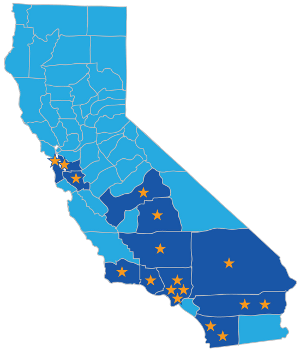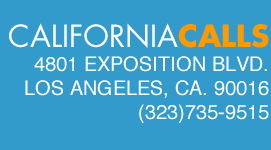Compared to Statewide Vietnamese Voters Who Voted at 11 Points Lower
SAN JOSE, CA – A California Calls/Working Partnerships USA voter outreach program tailored specifically for Vietnamese voters in 35 counties around the state raised voter participation and produced stronger support for Prop 30 than statewide Vietnamese voting averages, Anthony Thigpenn, California Calls chairman, announced today.
California Calls, a statewide alliance of 31 grassroots, community-based organizations representing poor and working class families, communities of color, immigrants, and young people and San Jose-based Working Partnerships, an organization that is part of the California Calls statewide alliance, reached out to Vietnamese voters in the months leading up to the election. Those Vietnamese voters contacted by the alliance came out for Prop 30 at a 75% turnout rate compared to the 64% of Vietnamese voters statewide – an 11 point difference.
Working Partnerships canvasses the Bay Area region to reach and mobilize the diverse immigrant communities year-round. This was the first time the group deployed an all Vietnamese bilingual team to target Prop 30 voters, by phone. The importance of voting and education was emphasized to older voters born in Vietnam, said Chieu-An Tonnu, the Vietnamese team leader during the Prop 30 campaign. But younger, second generation voters do not typically care about civic engagement. Instead, it was tuition cuts that got their attention, Tonnu said.
Prop 30 was a California initiative that temporarily raised some state taxes to fund education and public safety. Using 14 phone bankers, ranging in age from 16 to their 50s, the Vietnamese team called into Santa Clara, Orange, Los Angeles, San Francisco and San Diego counties. The Vietnamese script was revised from the English version so that it took culture and social mores into consideration.
Since 2008, tuition at San Jose State University and at the California State University System has gone up 141%.
“If we hadn’t reached out to these voters, they would not have voted,” said Tonnu. “We really connected with them. We were speaking the same language, so it was easier to persuade them to go vote. When a Vietnamese person speaks to another Vietnamese person, there’s a lot more respect and they will give you a chance to let them say what you want to say.”
Other data from California Calls’ analysis show:
Vietnamese voters contacted in the weeks leading up to the election by California Calls/Working Partnerships in Santa Clara County turned out at 82% in comparison to the 69% Vietnamese voters who turned out overall in the county.
In Orange County, Vietnamese voters contacted by California Calls/Working Partnerships turned out to vote at five points higher with a 76% turnout in comparison to 71% turnout countywide. In Los Angeles County, Vietnamese voters contacted turned out at 58% — six points higher than Vietnamese voters not contacted by the outreach program.
18-24 year old Vietnamese voters identified as alliance supporters turned out 12 points higher than overall Vietnamese statewide voters and by 11 points higher for 25-34 year olds.
95% of Vietnamese voters California Calls/Working Partnerships spoke to were born outside the United States. They turned out 8 points higher than statewide foreign-born Vietnamese voters.
64% of Vietnamese voters California Calls/Working Partnerships spoke to were new and occasional voters. They turned out at 6 points higher than statewide new and occasional Vietnamese voters.
There are 58,944 registered Vietnamese voters in Santa Clara County alone and statistics show they make up 7% of all registered voters in Santa Clara. San Jose has more Vietnamese Americans than any American city and Orange County has more Vietnamese Americans than anywhere in the country.
“Our success shows that the message – as well as who delivers it – matters,” said Derecka Mehrens, organizing director of Working Partnerships. “Our goal is to build power in the precincts in which Vietnamese voters live.”
According to California Calls data, new and occasional voters who had been identified before the election as supporters of Proposition 30 created the winning margin for the ballot measure. The expanding electorate – growing numbers of young voters, people of color, and low-income voters – was critical to Prop 30’s passage. Data show that people of color made up nearly half of the electorate in California in the November 2012 election.
California Calls’ organizations have worked with local and statewide allies to reach out to immigrant communities, dividing turf where possible. In November 2012, this included Asian Pacific Environmental Network (APEN) Action, Asian Pacific American Legal Center (APALC), and Mobilize the Immigrant Vote (MIV) Action doing in-language phoning to Asian voters. In the Bay Area, voter outreach last year was conducted in Spanish, Chinese, Vietnamese, and Tagalog.
During California Calls’ statewide get-out-the-vote campaign, the alliance identified 294,000 voters who committed to vote yes on Prop 30. Out of those supporters, and based on the organization’s own data and analysis, 80% of those individuals turned out to vote, making up 3.36% of the total vote. Overall, California Calls’ organizing efforts increased voter turnout by 8-15 percent above the statewide average.
Since 2009, California Calls, using a “California Dream” narrative, sophisticated phone technology and an array of grassroots volunteers, has targeted immigrants, working class families, African Americans, Latinos and the poor to develop and test methods to reach and mobilize infrequent voters in rural and urban areas.
The alliance has identified 567,000 voters who share a vision of progressive tax and fiscal reform and believe the wealthy and large corporations should be taxed more to pay their fair share. The goal is to create a tipping point in statewide elections of 500,000 new and occasional voters consistently voting in support of California Calls’ policy agenda.


